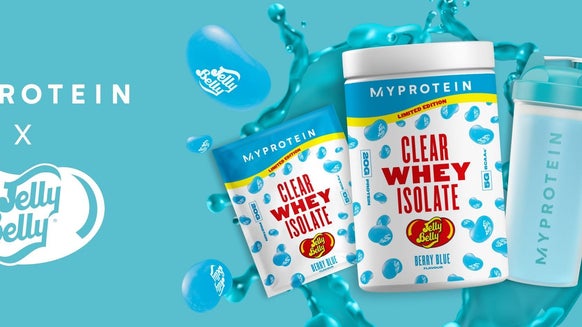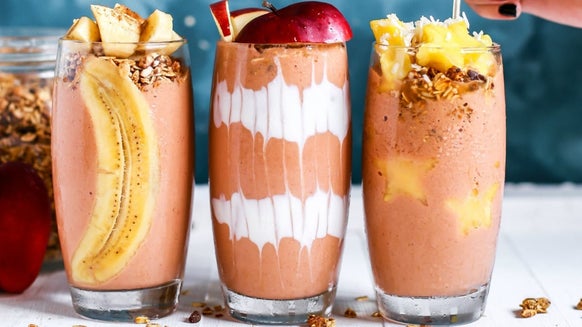
Polycystic ovary syndrome (PCOS) is a condition that affects up to one in five women of reproductive age and one of the leading causes of anovulatory infertility. It's surprising then that many people have never even heard of it, let alone know the pain it can cause.
To help raise awareness of the condition, expert nutritionist Richie Kirwan has made it the subject of this instalment of Nutritionist Explains. In the video, he discusses how nutrition and exercise can help women with PCOS to live healthier lives.
What is PCOS?
PCOS is a condition that alters hormone production in women. Because it's a syndrome (a group of symptoms that often occur together), the experience of PCOS varies significantly between women, but there are some common symptoms.
Hyperandrogenism (excess testosterone production) is one of the most common symptoms associated with PCOS. It can lead to excessive hair growth and even male pattern baldness.
Insulin resistance, the reduced ability of the body to respond to the insulin we produce, is another common symptom of PCOS. This is often associated with low blood sugar control and leads to a greater risk of obesity and other serious health conditions.
Chronic irregular ovulation is also typical and can result in irregular and painful periods. Another common feature is polycystic ovaries, which is the formation of cysts in the ovaries.
To be diagnosed with PCOS, you may only need to suffer with two of the above symptoms. This means you can have polycystic ovary syndrome without actually having polycystic ovaries — and vice versa.
PCOS can be a really unpleasant condition to live with that unfortunately has no cure, but the symptoms can be managed effectively through diet and exercise.
Excess body weight
Excess body weight is one of the most common manifestations of PCOS. Women with PCOS are much more likely to be overweight or obese (although some women have what’s known as “lean PCOS” and experience other symptoms while maintaining a lower body weight).
For women with PCOS and obesity, losing some excess body weight can be beneficial. Some studies have shown improvements in hirsutism, insulin resistance and circulating androgen hormones like testosterone, and other studies have shown that reduced-calorie diets and weight loss of around 5% of body weight can lead to improvements in period regularity and even fertility.
Now, why is this? There are a few reasons. The first is women with PCOS can have a much lower metabolic rate (BMR). One study found that women with PCOS and insulin resistance can have a 40% lower BMR than women without PCOS and insulin resistance. The same study found that women with PCOS but not insulin resistance had a higher BMR but still one lower than the general population.
It’s a huge difference and means women with PCOS find it a lot easier to gain weight, even if they were eating the normal daily recommended calories of women without the condition.
There's also evidence suggesting that the increased testosterone levels can affect satiety hormones (the hormones that make you feel full) meaning that some women will experience increased appetite and food cravings and be more prone to binge eating, so may need to be more conservative with their calories.
Calorie deficits
To stick to a diet long-term, it must be sustainable. Food choices can be hugely important: you need to eat foods that you enjoy and keep you full.
Protein should be first on the list, as it’s the most filling of all the macros. Aim for 30g of protein (roughly an average-sized chicken breast) per meal. Then fill up the rest of your plate with low-calorie-density, high-volume foods like fruit and veg.
Fibre is also your friend. High-fibre foods like fruits, vegetables, whole grains and legumes can keep you feeling fuller for longer by absorbing water in your digestive system and slowing the emptying of food.
This type of eating plan, based mostly on whole foods, will have a low glycemic load so you’ll have smaller effects on your blood sugar, which may help improve insulin sensitivity.
Extreme diets
You may hear from many sources online that you need to go keto and cut the carbs if you have PCOS. But this is simply not true. A low-carb diet is absolutely fine if it’s your preference, but it’s by no means a diet you must follow.
Food cravings can be also higher with PCOS, so allowing yourself some of the foods that you crave can eliminate the risk of binge eating and help you maintain an overall healthy diet.
Exercise
Exercise is important for women with PCOS. The combination of aerobic and resistance exercise can reduce insulin resistance and raise your resting energy expenditure. Exercise can also help to reduce the risk of PCOS-associated health conditions like cardiovascular disease and diabetes.
On top of this, exercise can have many health-promoting benefits other than weight loss. 30 minutes of moderate exercise per day is great for health and resistance training two or three times a week can help maintain healthy muscle and strength levels.
Women with lean PCOS should not aim to lose weight. Instead they should aim for a healthy lifestyle while maintaining their current weight.
Supplements
Inositol
This supplement has some of the most exciting evidence found during research so far. Many studies have shown that inositol can help with insulin resistance, which is common in people with PCOS. Ordinarily inositols are substances that are produced in our cells, but the hormone disruptions caused by PCOS can cause inositols to be metabolised slightly differently. Supplementing with inositol may reduce androgen hormones, improve blood sugar control and help improve ovulation and fertility.
Berberine
This supplement is a compound found in the roots of some plants that are commonly used in herbal medicines. For many women with PCOS, supplementing with berberine seems to have many of the same benefits as inositol.
L-carnitine
Women with PCOS tend to have lower levels of L-carnitine, a molecule involved in fat metabolism. Levels tend to be even lower in women with PCOS and high body fat and greater insulin resistance. Because of this, supplementing with L-carnitine may help improve insulin sensitivity, reduce body fat and improve hormone levels.
Omega-3
Richie recommends that most people take omega-3, but especially women with PCOS as they are at greater risk of heart disease and diabetes.
Take home message
If you suffer with PCOS, your doctor should of course be your first port of call to help you manage your symptoms. But on top of that, by trying some of Richie’s nutrition and exercise advice, you may be able to improve some of the symptoms.








